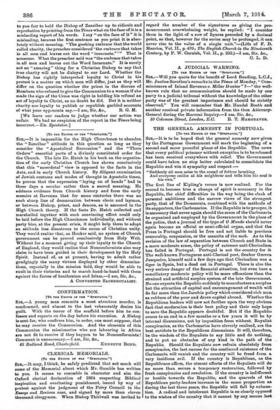[To TIM Roma or Tar .8rzeraros."] SIB,—It is impossible for
the High Churchmen to abandon the "Zanzibar" attitude in this question as long as they consider the " Apostolical Succession" and the "Three Orders" essential parts of a divinely constituted order for the Church. The late Dr. Hatch in his book on the organiza- tion of the early Christian Church has shown conclusively that this "sacerdotal" view is opposed to the facts in the Acta, and in early Church history. By diligent examination of Jewish customs and modes of thought in Apostolic times, be proves that the expression "laying on of hands" bad in those days a secular rather than a sacred meaning. He adduces evidence from Church history and from the early mosaics at Ravenna that for some centuries there was no such sharp line of demarcation between cleric and layman, or between Bishop, priest, and deacon, as is assumed in the High Church theory. If the facts Dr. Hatch collected and marshalled together with such convincing effect could only be laid before the High Churchmen individually, and without party bias, at the present crisis, it might help them to adopt an attitude less disastrous to the cause of Christian unity. They would realize that, as Hooker said, no system of Church government can be proved conclusively from Holy Writ. Without for a moment giving up their loyalty to the Church of England, they would realize that Nonconformists also may claim to have been guided in their development by the Holy Spirit. Instead of,.as at present, having to admit rather grudgingly the many virtues displayed by other denomina- tions, especially in the mission field, they would be able to exult in their victories and to march hand-in-hand with them against the forces of heathenism and Islam.—I am, Sir, &c., A CONVERTED SACERDOTALIBT.














































 Previous page
Previous page